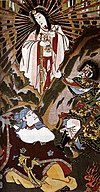Hinomisaki Shrine
| Hinomisaki Shrine | |
|---|---|
 | |
| Religion | |
| Affiliation | Shinto |
| Deity | Amaterasu, Susanoo, Ame-no-Fuyukinu |
Hinomisaki Shrine is a Shinto shrine located in Izumo, Shimane a few miles away from Izumo-taisha[1] dedicated to Amaterasu and Susanoo-no-Mikoto.[2] It is a branch shrine of Izumo Taisha, and has a document identifying Susanoo with Matarajin.[3]: 171
Amago Tsunehisa backed the shrine to undermine the influence of Izumo-taisha.[1][4]
Its island has a notable lighthouse which is the tallest one in Asia.[3]: 406
Priests of the Shrine were instrumental in spreading the idea that Izumo Province was the gate to the underworld, and a source of power as a result where all things originated.[3]: 166–167 [4]
Its origin story mentions sea snakes guiding the gods to Izumo.[3]: 173 Sea snakes are considered the messengers of Izumo Taisha.[5]

Worship of Ame no Fuyukinu
[edit]Ame-no-Fuyukinu is also worshipped at Hinomisaki Shrine. Legends say he founded this shrine. The Ono family works as priests there. They claim to be his descendants.[6]
The shrine has a ritual. It is called the "Shinken hōten shinji." This means "sword offering ritual." The ritual is based on the Kusanagi sword myth. His delivery of the sword Kusanagi no Tsurugi to Amaterasu. This sword is one of the Imperial Regalia of Japan.[6]
References
[edit]- ^ a b Zhong, Yijiang (2016-10-06). The Origin of Modern Shinto in Japan: The Vanquished Gods of Izumo. Bloomsbury Publishing. ISBN 978-1-4742-7110-3.
- ^ Ponsonby-Fane, R. A. B. (2016-05-11). Studies In Shinto & Shrines (1st ed.). Routledge. p. 383. ISBN 978-1-138-98322-9.
- ^ a b c d Faure, Bernard (2021-12-31). Rage and Ravage: Gods of Medieval Japan, Volume 3. University of Hawaii Press. ISBN 978-0-8248-8936-4.
- ^ a b Weiss, David (2022-01-13). The God Susanoo and Korea in Japan's Cultural Memory: Ancient Myths and Modern Empire. Bloomsbury Publishing. ISBN 978-1-350-27120-3.
- ^ D, John (2011-11-09). "Izumo's welcome party (Kamiari sai)". Green Shinto. Retrieved 2023-04-12.
- ^ a b "Amenofuyukinu, Amenofukine | 國學院大學デジタルミュージアム". 2023-11-14. Archived from the original on 2023-11-14. Retrieved 2023-11-14.
{{cite web}}: CS1 maint: bot: original URL status unknown (link)

